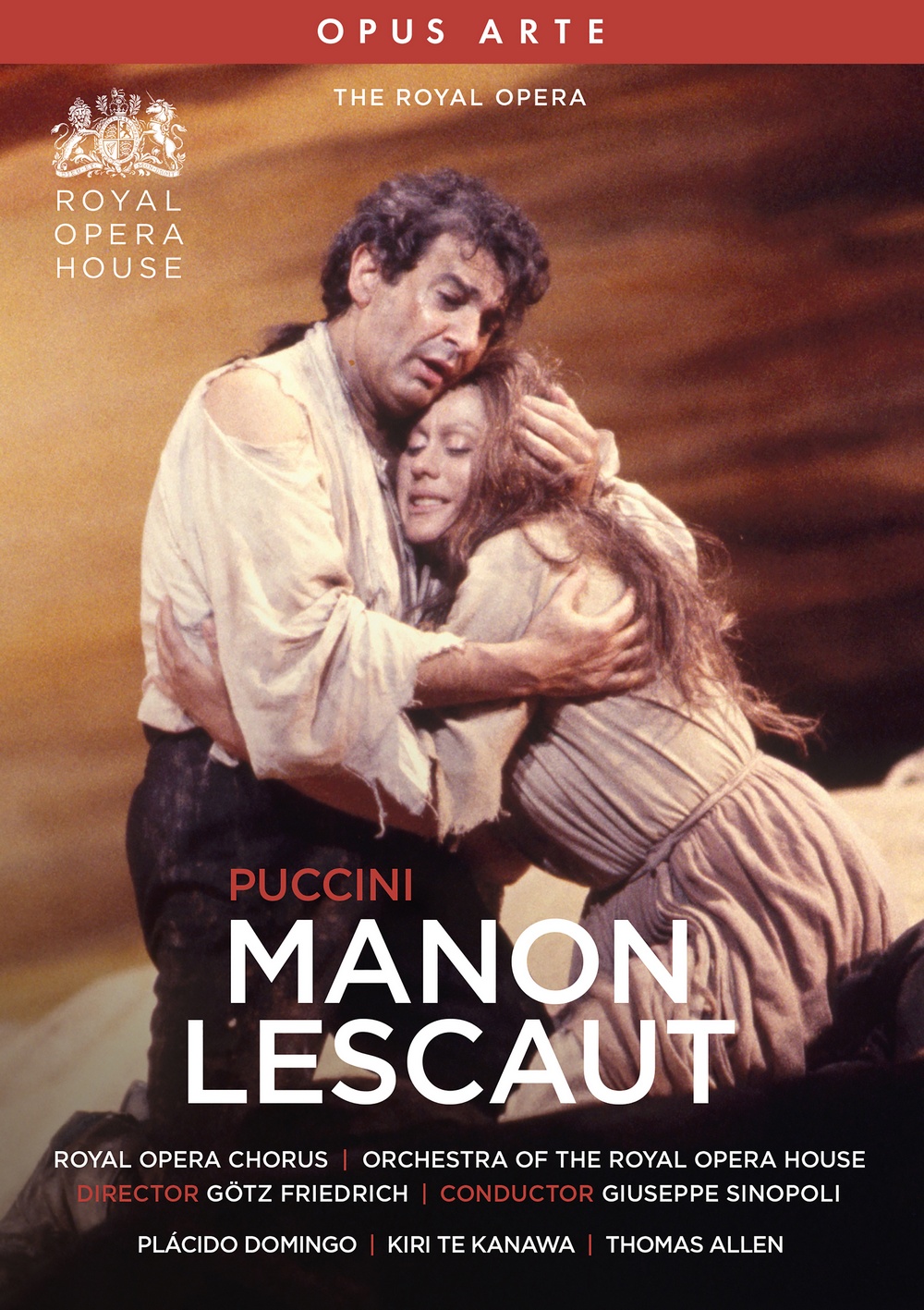Robin Leggate (Edmondo); George Macpherson (The Innkeeper); Plácido Domingo (Chevalier des Grieux); Thomas Allen (Lescaut); Kiri Te Kanawa (Manon Lescaut); Forbes Robinson (Geronte di Ravoir); Anna Cooper (Madrigal Singer); John Fryatt (A Dancing Master); Handel Thomas (Sergeant of Archers); Paschal Allen (Sergeant of Soldiers); Roderick Earle (A Naval Captain); Mark Curtis (Lamp Lighter)
Puccini began to compose Manon Lescaut in 1889. It was an act of supreme bravado as only five years previously Massenet had premiered Manon, based on the same novel by Abbé Prévost. The story is set in France and Louisiana in the early 18th century and focuses on – in a way different to Massenet – the fortunes and tragedy of the hero, the Chevalier des Grieux, and his lover, Manon. Its ceaseless melodic beauty and drama were recognised immediately and the first night was an overwhelming triumph, with Puccini effectively anointed as Verdi’s successor and Italy’s greatest operatic composer.
Ninety years after its 1893 premiere in Turin, the work was staged by the Royal Opera House, Covent Garden. The 1983 production was conducted by Giuseppe Sinopoli, making his British operatic debut to such remarkable effect that The Times referred to him as ‘Europe’s most spectacular new opera star’. The cast included three of the greatest exponents of their roles; Plácido Domingo as the romantic hero whose performance ‘was a cause for drop-jawed wonder’ (The Spectator), the radiant Kiri Te Kanawa as Manon and Thomas Allen as her brother, Lescaut. Director Götz Friedrich’s largely traditional staging proved a major theatrical success.
DVD
Giuseppe Sinopoli
Orchestra of the Royal Opera House; Royal Opera Chorus
Robin Leggate; George Macpherson; Plácido Domingo; Thomas Allen; Kiri Te Kanawa; Forbes Robinson; Anna Cooper; John Fryatt; Handel Thomas; Paschal Allen; Roderick Earle; Mark Curtis; Orchestra of the Royal Opera House; Royal Opera Chorus; Giuseppe Sinopoli
"Conductor Giuseppe Sinopoli is 'one of the opera world's hottest properties - he sets scores ablaze'" (The Times)
Robin Leggate (Edmondo); George Macpherson (The Innkeeper); Plácido Domingo (Chevalier des Grieux); Thomas Allen (Lescaut); Kiri Te Kanawa (Manon Lescaut); Forbes Robinson (Geronte di Ravoir); Anna Cooper (Madrigal Singer); John Fryatt (A Dancing Master); Handel Thomas (Sergeant of Archers); Paschal Allen (Sergeant of Soldiers); Roderick Earle (A Naval Captain); Mark Curtis (Lamp Lighter)
Puccini began to compose Manon Lescaut in 1889. It was an act of supreme bravado as only five years previously Massenet had premiered Manon, based on the same novel by Abbé Prévost. The story is set in France and Louisiana in the early 18th century and focuses on – in a way different to Massenet – the fortunes and tragedy of the hero, the Chevalier des Grieux, and his lover, Manon. Its ceaseless melodic beauty and drama were recognised immediately and the first night was an overwhelming triumph, with Puccini effectively anointed as Verdi’s successor and Italy’s greatest operatic composer.
Ninety years after its 1893 premiere in Turin, the work was staged by the Royal Opera House, Covent Garden. The 1983 production was conducted by Giuseppe Sinopoli, making his British operatic debut to such remarkable effect that The Times referred to him as ‘Europe’s most spectacular new opera star’. The cast included three of the greatest exponents of their roles; Plácido Domingo as the romantic hero whose performance ‘was a cause for drop-jawed wonder’ (The Spectator), the radiant Kiri Te Kanawa as Manon and Thomas Allen as her brother, Lescaut. Director Götz Friedrich’s largely traditional staging proved a major theatrical success.
DVD
Giuseppe Sinopoli
Orchestra of the Royal Opera House; Royal Opera Chorus
Robin Leggate; George Macpherson; Plácido Domingo; Thomas Allen; Kiri Te Kanawa; Forbes Robinson; Anna Cooper; John Fryatt; Handel Thomas; Paschal Allen; Roderick Earle; Mark Curtis; Orchestra of the Royal Opera House; Royal Opera Chorus; Giuseppe Sinopoli
"Conductor Giuseppe Sinopoli is 'one of the opera world's hottest properties - he sets scores ablaze'" (The Times)




























